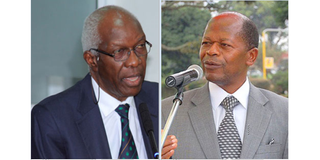Prime
900 city schools do not have licences

Auditor General John Muwanga and State Minister for Higher Education, Mr John Chrysostom Muyingo. PHOTOS | FILE
What you need to know:
- The city authority’s director for education services, Ms Juliet Namuddu, told this publication last week that they have started inspecting all schools in the city to ensure that all of them are registered and licenced.
At least 900 private schools in the capital city are operating without licences, the latest Auditor General report has revealed.
The 2022 report indicates that nearly half of the schools operating in the city are not registered with Kampala Capital City Authority (KCCA) as is required by law.
Out of 1,927 schools whose licensing status was reviewed, it was found that only 865 are registered; 928 were not registered; 134 schools were provisionally licensed, out of which the provisional licences of 102 schools had expired.
“I further noted that except for the schools which were issued closure notices as far back as 2018 but are still operating, other schools had never been issued closure notices by KCCA,” the Auditor General reported.
“Schools are at risk of declining to worrying levels. This was attributed to the inadequate monitoring and enforcement by the KCCA education department,” the Auditor General said.
The city authority’s director for education services, Ms Juliet Namuddu, told this publication last week that they have started inspecting all schools in the city to ensure that all of them are registered and licenced.
Ms Namuddu said their operations were affected by the Covid-19 lockdown which saw the government close all educational institutions across the country for nearly two years.
“There are very many mushrooming schools in the city and as the authority, we were constrained by the Covid-19 pandemic. Since the pandemic is no longer with us, we have started our inspections,” Ms Namuddu said.
“By the next financial year 2023/2024, all schools in the city will be fully registered and licenced by the authority. All those that will be found wanting will be closed,” she added.
She reported that schools begin operating before they apply to be licenced and the activity of surveying communities to identify unlicensed schools is intensive and the rate at which schools are mushrooming beats institutional capacity in terms of resources.
The State Minister for Higher Education, Mr John Chrysostom Muyingo, was astonished by the huge number of unregistered schools, saying in an interview with the Monitor that it was a big surprise that all these schools are operating without licences.
“I need to first see what the Auditor General has to say about these schools. But I do not think it is true because before any school starts operating, they are supposed to get a licence. We have been very strict [about] this,” Mr Muyingo said.
Section 32(1) of the Education Act 2018 requires that any person, community or organisation must obtain a provisional licence, which covers the first two years of a school’s operation, before opening.
Furthermore, Section 34 states that if after two school years, the permanent secretary, chief administrative officer or town clerk is satisfied that the school has met all conditions set in the Act, such a school will be registered.
Most of the schools operating in Kampala are privately owned, with only 79 schools being public institutions which fall under the supervision of KCCA.
The chairperson of the National Private Education Institution Association, Mr Hasadu Kirabira, blamed the failure of private schools to register on corruption and bureaucracy.
“The bureaucracy in registering these schools is a big problem countrywide. The problem is that the checklist for the licensing is the same checklist for registration which conditions are quite many,” Mr Kirabira said.
“The licence is for two years before you are registered. You have to spend a lot of money to acquire both, however, much you have all the requirements. The Ministry of Education should put registration online to avoid the bureaucracy, corruption and all that,” he said.
Requirements for registration
• A clear structural plan.
• Fully approved building plans with key structures such as library, laboratories, classrooms, toilets, kitchen, accommodation, playground, perimeter wall, and school signpost, among others.
• Old boys and girls on the board of governors. School administrators complain that it is hard for a school to have old boys and girls on the board of governors before it starts operating.
• A list of registered teachers with registration certificates.
School management committee for primary and board of governor for secondary approved or elected by parents’ body.
• Photographs of the school with students in class and on parade as well as a bank statement in the name of the school.


